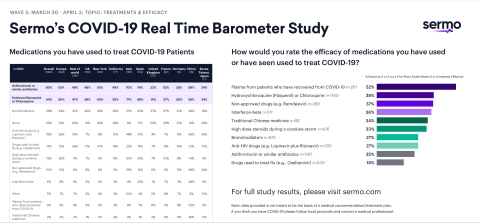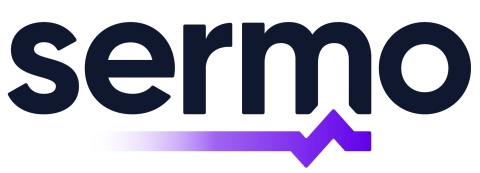Sermo Reports Hydroxychloroquine Usage Expands Globally, Plasma Is Perceived as More Effective Than Hydroxychloroquine, Remdesivir Efficacy Perceptions on the Rise
Sermo Reports Hydroxychloroquine Usage Expands Globally, Plasma Is Perceived as More Effective Than Hydroxychloroquine, Remdesivir Efficacy Perceptions on the Rise
Data from week two of largest ongoing international market research study on COVID-19
NEW YORK--(BUSINESS WIRE)--Week two data of the Barometer study from 5,000 physicians in 30 countries conducted by Sermo reveals the emergence of treatment patterns. Sermo, the largest global healthcare polling company and social platform for physicians, has published unrestricted access to the results of its Real Time Barometer study on sermo.com.
Key findings:
-
Usage patterns and efficacy perceptions among COVID treaters:
-
The top three treatments that doctors most reported prescribing were Azithromycin (50%), Hydroxychloroquine (44%), and bronchodilators (36%)
- The treating physician percentage for Hydroxychloroquine went up across the board globally
-
COVID treaters reported having prescribed or seen Hydroxychloroquine prescribed increase by 11% (from 33% to 44%) week over week and Azithromycin increase by 9% (from 41% to 50%)
- Italy had the highest increase in having prescribed or seen Hydroxychloroquine prescribed (from 50% to 71%). Reported usage in New York nearly doubled (23% to 40%), week over week.
-
The top three treatments that doctors most reported prescribing were Azithromycin (50%), Hydroxychloroquine (44%), and bronchodilators (36%)
-
Perceived treatment efficacy:
-
The top three treatments that have been used/seen used and reported as very or extremely effective among COVID treaters include:
- 52% plasma from recovered patients (n=261)
- 38% Hydroxychloroquine (n=1160)
- 37% non-approved drugs (e.g. Remdesivir) (n=389)
- Italy, Spain, France, and China have higher perceptions of Hydroxychloroquine’s efficacy vs. the rest of the world
- Plasma from recovered patients is perceived as more effective than Hydroxychloroquine (52% of COVID treaters felt it was very to extremely effective vs Hydroxychloroquine at 38%)
- Plasma, however, is reported as one the least utilized treatments, suggesting either a lack of availability, scalability, or awareness
- Usage of anti-HIV drugs (e.g. Lopinavir plus Ritonavir), drugs to treat the flu (e.g. Oseltamivir), and plasma from recovered patients, remains steady week over week at 19%, 17%, and ~5%, respectively; use of non-approved drugs (e.g. Remdesivir) decreased slightly from 12% to 10%
- Starting to surface in the data as a treatment option is Tocilizumab, an IL-6 inhibitor
-
The top three treatments that have been used/seen used and reported as very or extremely effective among COVID treaters include:
-
Most popular Hydroxychloroquine dosage regimen:
- 42% report using 400mg BID on day one (800mg total), then 400 mg daily for 5 days
- 31% report using 400mg BID on day one (800mg total), then 200mg BID for 4 days
An anonymous Pediatrician on Sermo commented, “I took Chloroquine for a year in southeast Asia to prevent malaria. So did another 3,000,000+ soldiers. I suffered no ill effects and this letter is proof of no death. The dead do not have time for the FDA's randomized clinical trials. Just ask them.”
“The data is fantastic, representing a large international data set and our first glimmer of treatment. While reason for optimism, as a clinical researcher, I strongly recommend to pause at further interpretation until we can measure the clinical effectiveness,” said Dr. Brian Ferris, Vascular Surgeon and President of the Pacific NW Vascular Society in Washington state.
“We are humbled by the tireless work of doctors on the front lines and their contribution, enabling us to collect this data and make it universally available,” said Peter Kirk, CEO of Sermo. “To all the doctors who are participating, in aggregate you form the powerful voice of doctors globally.”
Methodology
Most results are reported for individual countries with a minimum sample size of 250. A sample size of 250 point estimates have a precision of a +/- 6% precision at a 95% confidence level. Where sample sizes are smaller, N sizes are noted. Thirty countries included in the study are the United States, Canada, Argentina, Brazil, Mexico, Germany, Italy, the United Kingdom, France, Spain, Belgium, the Netherlands, Sweden, Turkey, Poland, Russia, Finland, Ireland, Switzerland, Austria, Denmark, Norway, Greece, Taiwan, Japan, South Korea, Australia, China, India, and Hong Kong. No incentive was offered to respondents. Full methodology.
About Sermo
Sermo is the largest healthcare data collection company and social platform for physicians, reaching 1,3MM HCPs across 150 countries. The platform enables doctors to anonymously talk real-world medicine, review treatment options via our proprietary Drug Ratings platform, collectively solve patient cases, and participate in medical market research. For more information, visit sermo.com.
Contacts
Media:
Niki Franklin
Racepoint Global on behalf of Sermo
+1 617 624 3264
Sermo@racepointglobal.com

